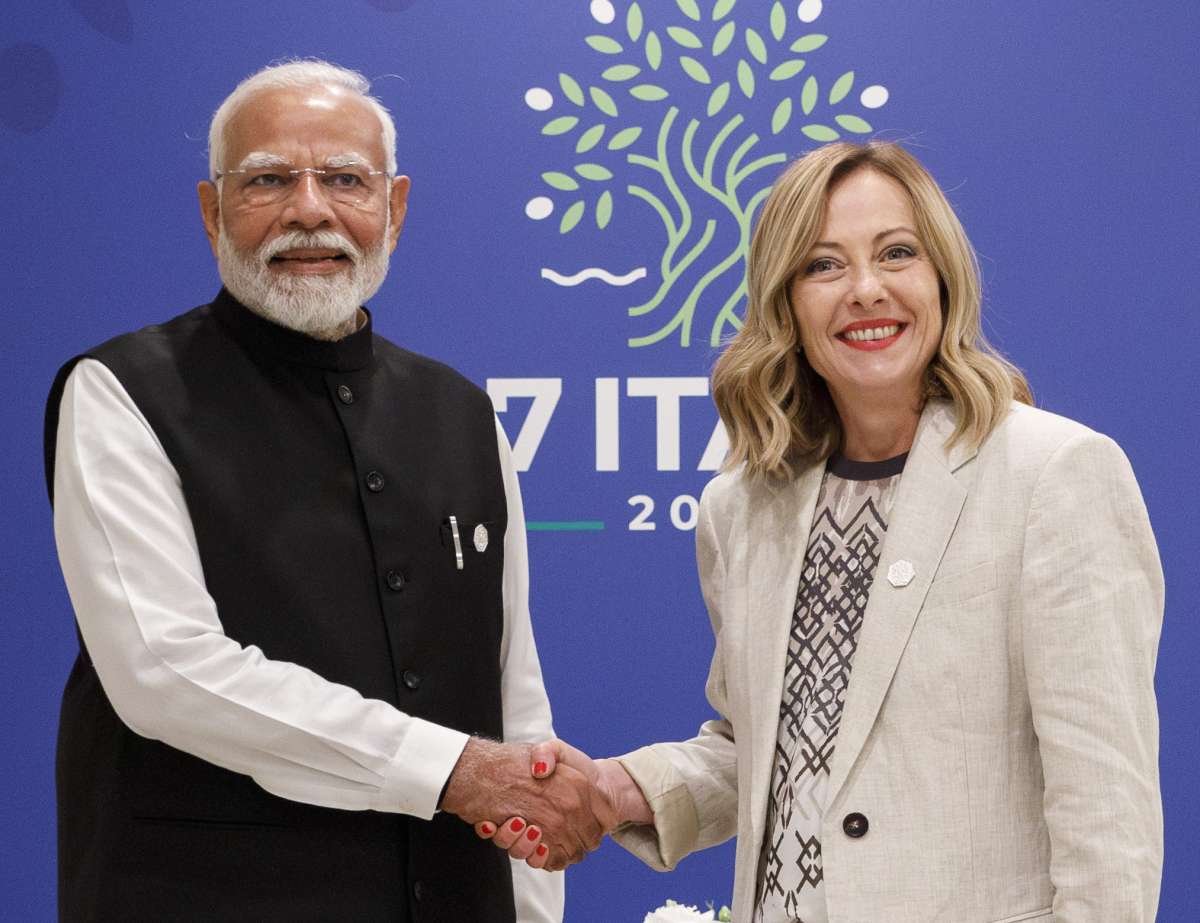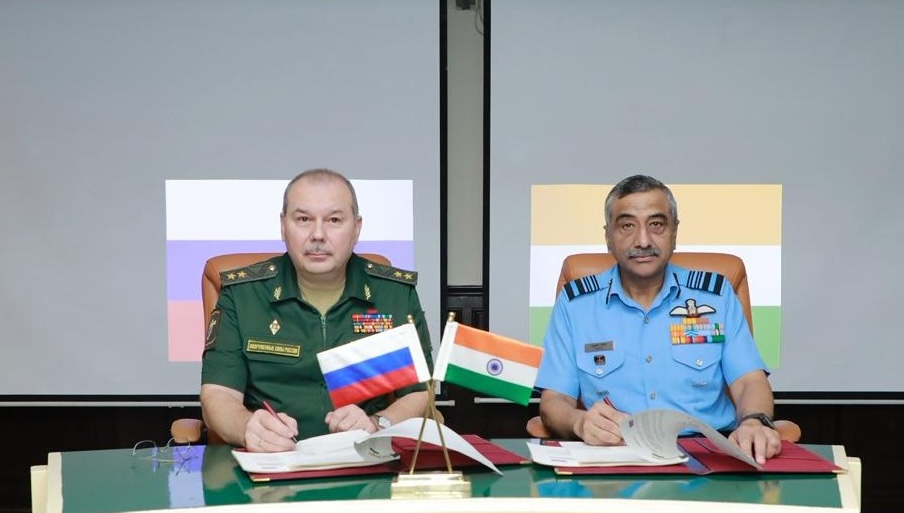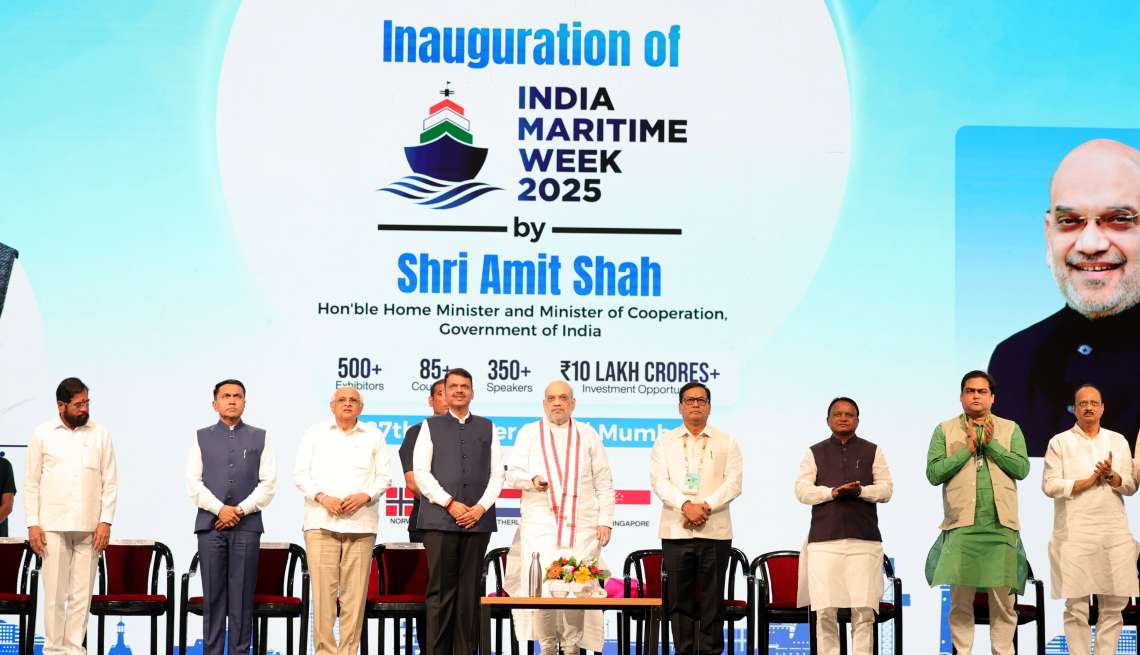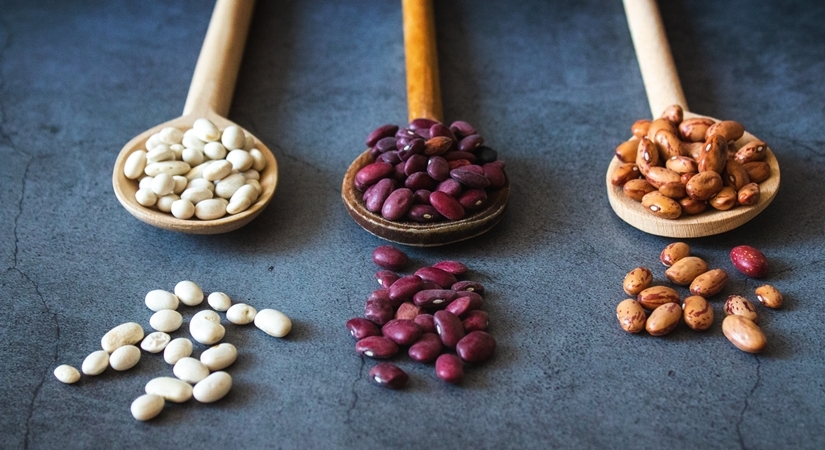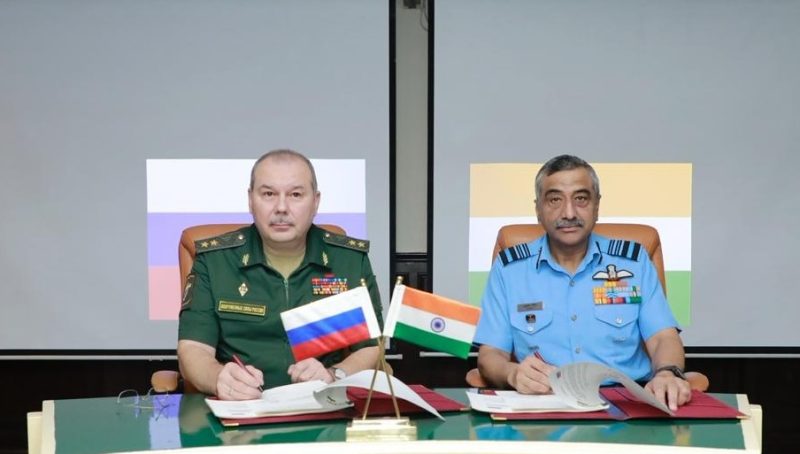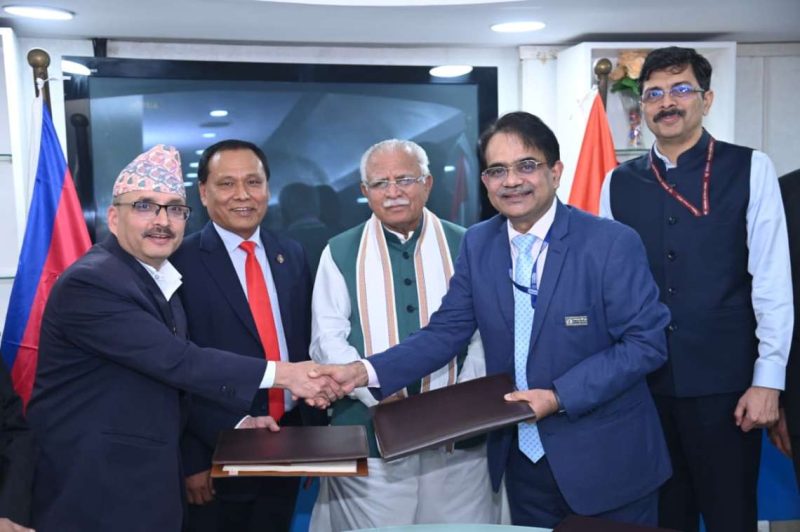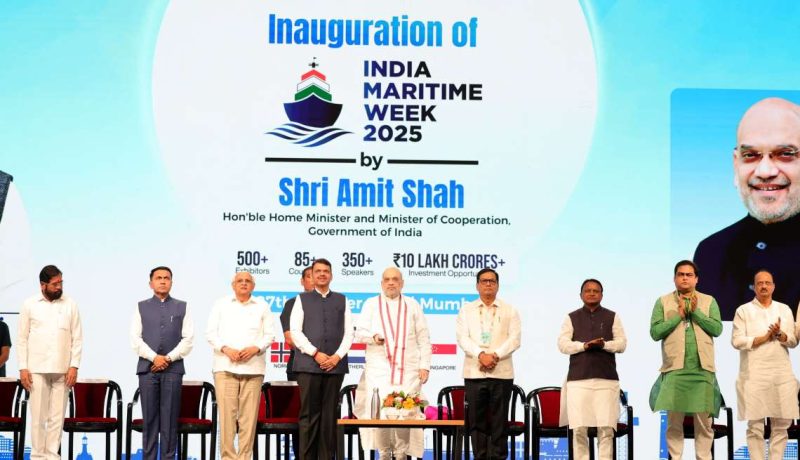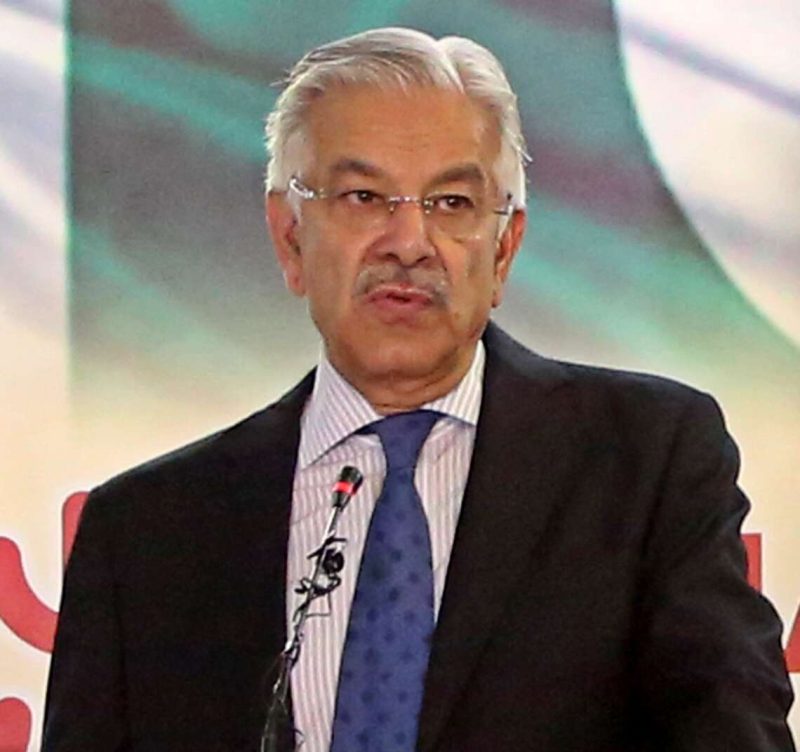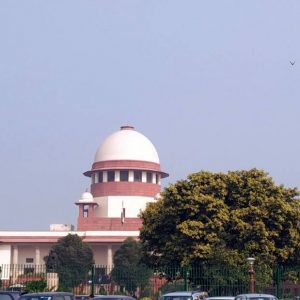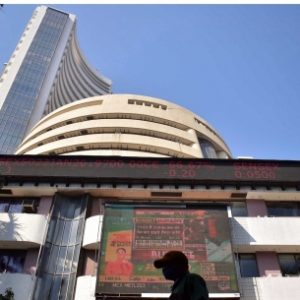Antonio Bartoli, Italy’s Ambassador to India, spoke exclusively on the road ahead and how the excellent relations enjoyed by the top leaders of two countries – Prime Minister Narendra Modi and Italian PM Giorgia Meloni – continue to transform bilateral ties.
As India and Italy continue to deepen cooperation in several spheres, including defence and security, science and technology, space, clean energy, migration and mobility linkages, Antonio Bartoli, the country’s Ambassador to India, spoke exclusively on the road ahead and how the excellent relations enjoyed by the top leaders of two countries – Prime Minister Narendra Modi and Italian PM Giorgia Meloni – continue to transform bilateral ties.
Excerpts:
Q: Earlier this week, Italian Prime Minister Giorgia Meloni was named as ‘Europe’s most powerful person’ which is being seen as an acknowledgement and acceptance of her growing popularity in the region and beyond. How do you see this?
Antonio Bartoli: One of her (Meloni’s) strong points is coherence and determination. Her government, the Italian government, is one of the most stable in Europe. I would say in the world, because in an era of liquid politics, where leaders change with a certain rapidity, she has very solid bases, and the coalition has been there for 30 years – more or less, in the same parties. She has a strong leadership, and this is an element that she has in common with PM Modi. That is why there is this personal chemistry, which is very important in nowadays’ politics, to also feed and develop relationships between states, and our bilateral relationship that is continuing to move forward at an unprecedented intensity.
Q: These are also good times for the India-Italy relationship with so many high-level interactions taking place this year, including over the past few weeks…
Antonio Bartoli: PM Meloni and PM Modi met on November 18, on the margins of the G20 summit in Rio. They signed a joint action plan, which gives a concrete and determined plan to give contents and projects to the strategic partnership that they established between Italy and India. They have identified 10 areas of cooperation which are top on the agenda, starting from political dialogue. For instance, the Minister of External Affairs S. Jaishankar came to Italy for the G7 and for the MED Dialogues, and other visits. Soon after, our Minister of Industry came here and now our Deputy Prime Minister is scheduled to visit for a big business forum, followed by the Minister of Defence who is also expected to come soon. So, there is a structure and an intense political dialogue and there are priority areas, including space and defence, connectivity, energy transition, security, mobility, people-to-people, science and technology. So a lot of things to do and realise and we are on the job!
Q: The government led by PM Modi has specifically focused on connectivity over the last 10 years. Do you think that the India-Middle East-Europe Economic Corridor (IMEEC), of which India and Italy are the founding members, could be a game-changer in future?
Antonio Bartoli: It’s a privilege to represent a vision for the future, that at the same time is deeply rooted in the past. Rome and India already traded millennia, centuries ago. Black pepper was one thing that the King of Visigoths asked Rome for as a ransom, because it was a precious and valuable good that we imported from India. So, this route has always been there. We are revitalising that perspective. This will go across the Middle East, which is a tormented area now as we have seen what is happening in Syria. But, we always have a vision for the future and the perspective of common and shared prosperity can be a factor of stabilisation and peace, also for that area. Italy is, has been, and will be the natural terminal of this corridor, especially with some ports like Trieste, which represent the gateway to the whole Europe, especially Central and Eastern Europe. We are also working on a ports collaboration agreement with India that could also be game-changers in future.
Q: Defence Minister Rajnath Singh visited Rome last year and had very constructive discussions with his Italian counterpart Guido Crosetto, exploring various avenues of enhanced partnerships as India focuses on ‘Make in India, Make for World’. How have the things moved forward since then?
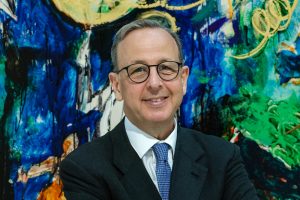
Antonio Bartoli: Defence and space are top on the agenda of the India-Italy Joint Strategic Action Plan. It means that we are assuring an ever-increasing presence in the Indo-Pacific region. At the end of November, we had an amazing ship Amerigo Vespucci visiting Mumbai. The ship was open to the local public and was the third port call in India by an Italian Navy vessel in 18 months, reflecting the importance Italy gives to the Indo-Pacific region. In October, a Joint Strike Carrier Group made of aircraft carrier Cavour, which is the main aircraft carrier of the Italian navy, and frigate Alpino, also visited India and held joint exercises. It is all about the presence in the Indo-Pacific region. The idea of ‘Make in India’ applies also to the defence sector, so our defence industries are eager and ready to move some productions here and develop co-design and co-production projects with the industry of India. The next step is to identify this area and proceed.
Q: PM Meloni-led Italian government believes that Italy and India are united by a sense of respect towards other countries. Is this shared approach binding the countries together more like ever before?
Antonio Bartoli: Respect is the right word, but not even enough, because there is a common idea of not patronising anybody and there is the common idea, even in different situations. You preach your multi-alignment, in the sense that India says legitimately so, we have to have our free hands, and so decide our partnerships in a free way. We are free as well, but we belong to a clear family of alliances, we are founders of the European Union, and of NATO. However, notwithstanding this different political background, the common idea is that of pursuing the national interest and not remaining hostage to preconceived destinies or ideologies. This is the way Italy is pushing forward its own agenda in the European Union, and this is the way India is playing as a global actor. So, there is respect in the sense that there is also the respect, for example, that we are using towards Africa, in a peer-to-peer relationship. We have launched this ambitious programme called ‘Piano Mattei’ plan because Mattei was a visionary entrepreneur in the oil and gas sector, was the head of ENI, which is the oil and gas giant of Italy. He was different from other companies in the oil and gas sector, insofar as he tried to establish a peer-to-peer relationship with great respect for their interlocutors in the producer countries in Africa. We are doing the same, developing investment projects, and I think that India could also partner in this. In general, we are never finger-pointing and never patronising so there is respect, admiration, and the capacity to put ourselves in others’ shoes, and to develop joint projects together. So, the hashtag Melodi is not just a slogan, it is a common vision, and is also witnessed by an intensity of relations, because when we talk about the signature of the joint action plan, that was the fifth time in two years that the two leaders met, so it is really a common vision.
Q: Indian diaspora also continues to play a significant role in Italy’s economic growth. How significant has been the contribution of the Indian community, estimated to be over two lakh now, in Italy?
Antonio Bartoli: It is a very good and integrated community, never having substantive problems. There are old communities – like for example, the Sikh community which have contributed, after they were in the British army, to the liberation of Italy from anti-fascism, and then they remained. They are very active in agriculture, industry, and restoration. But, this is only a part. Indians are frankly a very laborious and integrated community. What we will work on is to increase their number and also the quality by having newcomers with professional skills. That is why the agreement on mobility is so important, because it is a win-win situation. You have a huge manpower and we have gaps in our labour market. So, the idea is to bring from respective countries, in our case bring from India, qualified personnel, provided that they have been trained in India. The pilot project we are starting is with nurses because we need 65,000 nurses in Italy. So, we will teach Italian to would-be nurses, and when the linguistic competence, and, of course, their professional competence is certified, we will bring them to Italy.
Q: You arrived in New Delhi only in July… What has been your experience so far, as far as the growing relations between the two countries are concerned?
Antonio Bartoli: Well I think, I mean all diplomats say, but I really believe in it that we are very similar – distant but very close because we have common values despite having different religions. We are celebrating Christmas but it’s actually the same concept of Diwali, that of light, elimination of darkness and victory of good over evil. We both attach great importance to friendship, to family and even to food, which is not something to eat, to grab in two minutes like fast food. This is a catalyst for friendship and family reunions. So, I think there is this basis, as I said, there is a political common vision, the idea of pursuing the national interest, of a proud sense of identity, of cultural heritage. We are ancient civilizations, and I think there are objective complementarities. You intend to develop a more robust manufacturing system and we are an industrial powerhouse in Europe. 40 per cent of our exports here are made by machinery, so we can complement. We are two peninsulas in the respective dimensions. You are a giant, but we are two peninsulas projecting in the respective sea, and so we are export countries, we are interested in connectivity, we are interested in stability, and so the Indo-Pacific is also a basin where you are, Mediterranean is the basin that we are, but the two basins are connected in the area that is Indo-Mediterranean, and then this area represents 70 per cent of the trade of goods and services, 60 per cent of foreign direct investments, and so it’s not by chance that we are engaged together. For example, our soldiers in UNIFIL in Lebanon, we are engaged in protecting the freedom of navigation in the Red Sea, or in the Indian Ocean. So we are interested in stability and in connectivity. IMEEC is not only about railways and ships, it’s also about the internet, because there is also a digital corridor, our Sparkle, Telecom Sparkle, an Italian company, is completing the pause of a cable that will unite Mumbai, connect Mumbai to Geneva in Italy, and then Mumbai to Singapore. It’s a high-speed data highway that will be another factor of connectivity. So, the reasons are ancient, rooted in the past, and projected into the future.
Q: Having started off as a journalist and then, in your long career as a diplomat that saw you working in so many countries, also the US State Department, how do you see India’s rise in recent times, especially under Prime Minister Narendra Modi’s leadership?
Antonio Bartoli: Let’s start from the leader… Of course, Modi is an extraordinary political leader. I mean, one can have his own opinion, can agree or not agree, but he has an extraordinary capacity to connect with people. I mean, it suffices to see the Twitter account. He has the ability to build, that is fundamental for leader, and to give a sense of direction to people, to provide a narrative, which doesn’t mean an artificial narrative but a narrative in the sense that we have to strive for these objectives, and here is where we are going to like, for example, the 2047 objective. We all see that India is making a lot of headway in any sector. Of course, economic growth is evident, and there are still many fragilities… But, you are a very young country with the median age being 28 and you will remain a young country. You have a good level of education that, of course, you have to increase, but all the fundamentals are on your side. For this reason, and for the reason that you are a huge democracy and so we share the same values in Italy and Europe in general, we want to partner more and more with India.
Q: Italy is also a massive football stronghold – are there any plans to build more partnerships between the two countries in the field of sports?
Antonio Bartoli: Very much so! Frankly, I do believe a lot in sports diplomacy because our task is to build bridges and I think sport is a great catalyst for friendship. Unfortunately, we have different passions because cricket is not so popular in Italy. But I think especially that you are a continent, so especially in some areas of your huge country, there are football lovers, and what we are working on. The idea that we are developing, I just arrived, is to have coaches for youth teams. For example, starting with the ‘A-series’ teams that can send their coaches to teach kids, especially underprivileged kids, in summer camps, and then organise a tournament out of it. That would be a wonderful experience for these kids, and maybe a way of discovering new talents. There have been Italian players, above all Alessandro Del Piero, who came to India to play, and so we can have them as guests to launch this project.
Q: There is also another area that India and Italy can work on – boosting tourism via Bollywood movies that are shot in beautiful locations…
Antonio Bartoli: You know, talking about the leadership, and the rising role of India, this is another important factor. I mean, the soft power that is characteristic of big powers… You have an incredible soft power, also because you have a huge diaspora, which is another important factor, that represents a weight, politically, economically, in the respective hosting countries. Movies and Bollywood are also very interesting from our point of view because we think we have an extraordinary set. Italy is the country of widespread beauty, and we have pretty much everything, lakes, sea, same coastline of India in terms of kilometers, beautiful mountains and different ones because northwest Alps are Himalayan, the Dolomites are unique in the east, we have a wonderful countryside, we have, of course, beautiful islands, we have art cities, we have small villages, everyone which is with its own church, with own noble palace. So, it’s a widespread beauty and an incredible set. Like incredible India and incredible Italy. This is an opportunity for you because in a limited territory, you can have various options. It’s also interesting from the point of view of tax credit, and for us an extraordinary way of promoting our own territories. Both countries are punching below our weight in terms of interchange because there could be much, many more, Italian tourists to India and vice versa, and so we are eager to host not only movie productions. Not just that but also in different sectors… We can talk about weddings that are very popular, but also, you know, you are passionate about cycling, and there are wonderful cycle tours. You are passionate about Italian brands, and you can have many… It’s like Rome, you can visit the Palo Christian Rome, the Catacombs, the Renaissance Rome and the Baroque Rome… There are different layers and I think, especially for a more refined public, this is an incredible opportunity. Moreover, we have direct flights, which I hope will increase. But we have already, from Milan and from Rome, daily direct flights.
Q: Do you see, with the change of leadership in the United States, India, Italy, and US working together in several spheres?
Antonio Bartoli: Yes, because there is a common vision. (Donald) Trump looks harsher, more demanding in terms of, vis-a-vis Europe. I think he is right, from a certain point of view, because Europe must develop its own strategic capacity while remaining the most important partner for the United States because the transatlantic link is existential. But in sectors like defence, for example, to develop more is autonomy and of importance. I think that the new American president will also be benefiting India for several reasons. I mean, Trump was the one who revitalized, upgraded the Quad. He is more flexible with Russia, he is more assertive with China, and even the tariffs, if he will impose higher tariffs to China with respect to India, that would be a comparative advantage for India. So I think that also from this point of view, we are on the same boat and we can collaborate very well together.
ALSO READ: 28 Indians detained in Bahrain repatriated


